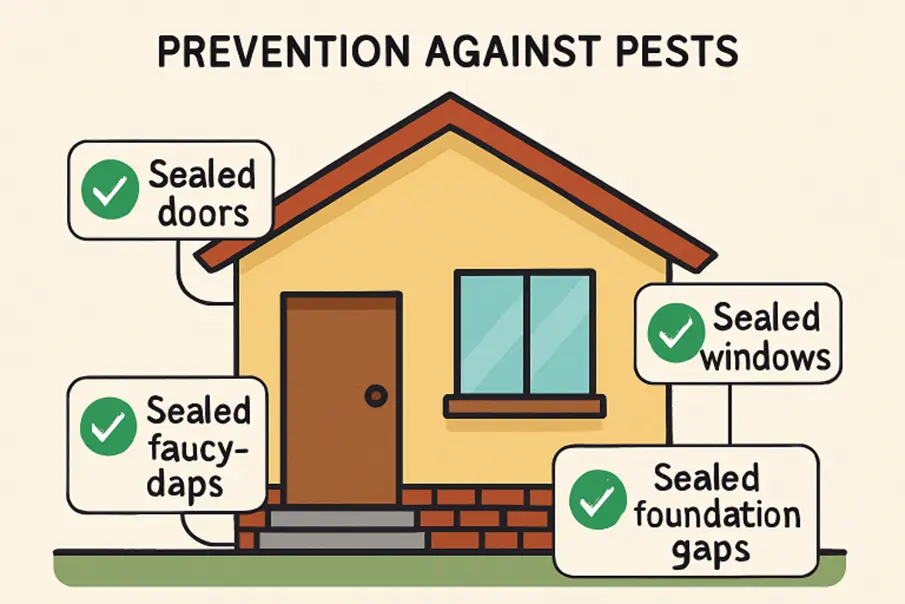Keeping pests out isn’t just about comfort—it’s vital for health and property. Pests carry diseases, damage structures, and create unsanitary conditions. Staying vigilant and applying preventive measures year-round can make your home less attractive to pests. Seeking advice from pest control professionals offers tailored strategies. Pests exploit small cracks and routine changes, so a layered defense—regular cleaning, food storage, yard care, and sealing entry points—is essential. Proactive habits protect your home and loved ones, as pests are attracted by food, moisture, and clutter, requiring ongoing prevention. Understanding and eliminating their entry points reduces future costs and chemical exposure. Consistency is key, as pests often go unnoticed until they become severe, making regular inspections crucial. All dwellings benefit from a proactive approach to pest control.
Seal Entry Points
Pests gain access to homes through surprisingly small gaps and cracks. Conduct a thorough inspection of your home’s foundation, exterior walls, and around utility lines. Consulting with pest control professionals in Concord can help identify hidden entry points and ensure long-term prevention. Focus on areas around windows, doors, and pipes—anywhere there may be a break in the barrier. Use weather-resistant caulk or steel wool for gaps, and install door sweeps to block the space beneath entry doors. Make it a seasonal habit to re-check these seals, as weather fluctuations can cause materials to expand or contract, creating new openings.
Maintain Cleanliness
Frequent and thorough cleaning discourages pests by removing food sources and hiding spots. Focus on vacuuming floors, scrubbing countertops, and immediately cleaning up crumbs or spills after meals. Don’t forget to check overlooked areas, such as the backs of appliances, pantries, and under sinks. Regularly bag and dispose of garbage, ensuring that you use bins with secure lids. This not only repels pests but also directly reduces their ability to thrive within your home.
Manage Food Storage
Poor food storage is one of the leading causes of kitchen infestations: store grains, cereals, and dried goods in airtight containers. Avoid leaving baked goods, pet food, or produce uncovered. Clean the pantry and cupboards routinely, discarding expired items promptly. Animal feed and pet treats should be stored in similarly sealed containers, and food bowls should be cleaned and emptied at night. Consistent diligence in the kitchen can significantly limit pest opportunities.
Control Moisture Levels
Moisture creates an ideal environment for insects like silverfish, cockroaches, and termites. Address leaky faucets, sinks, or pipes promptly and inspect under appliances for hidden dampness. Dehumidifiers in basements or attics can prevent mold and deter many house pests. Ensure that bathrooms and laundry rooms are adequately ventilated, and regularly inspect the roof gutters to prevent water from pooling around your home’s foundation.
Declutter Your Home
Excess clutter provides perfect harborage for both small insects and rodents. Regularly sort through storage spaces, closets, and garages to prevent the accumulation of clutter, such as cardboard, paper, or clothing piles. Use tightly sealed plastic containers for long-term storage to prevent nesting. By keeping living spaces organized, you dramatically reduce hiding spots and disrupt pest breeding cycles.
Maintain Your Yard
The condition of your yard often determines how easily pests can enter your home. Regularly mow the lawn, trim shrubs, and eliminate piles of leaves or debris that can shelter bugs and rodents. Store firewood away from your home and off the ground, and cut back branches or plants that touch your house. Outdoor maintenance not only keeps your property attractive but also removes key avenues for pest intrusion.
Use Natural Repellents
Many homeowners are interested in safe alternatives to chemical sprays. Natural repellents, such as diluted white vinegar and peppermint oil, can deter a variety of insect pests. A light mist of vinegar around entryways, patios, and along baseboards interferes with scent trails and discourages spiders and ants. Peppermint oil can be similarly effective, but it’s vital to ensure essential oils are safe for pets and children before use. Natural options can be a valuable supplement to other preventive measures, but should not replace regular cleaning and sealing routines.
Schedule Regular Inspections
Routine inspections help detect early signs of infestation before pests multiply and cause damage. Check attics, basements, garages, and seldom-used spaces for droppings, nesting materials, gnaw marks, bug casings, and dead insects near windows or in corners. If you notice unusual activity, consult a professional pest control service promptly to prevent the issue from escalating. Early intervention saves money and ensures long-term prevention. Regular preventive actions, combined with cleanliness and vigilance, are key to keeping your home pest-free. If you suspect pests, professional help provides a quick, effective resolution, keeping your home safe and comfortable year-round.
Conclusion
A pest-free home relies on consistent maintenance, awareness, and preventive action. By sealing entry points, maintaining cleanliness, managing food storage, and controlling moisture, homeowners can create an environment that is far less inviting to pests. Decluttering indoor spaces and maintaining the yard well also further reduces potential hiding spots and access routes. Incorporating natural repellents and scheduling regular inspections ensures that emerging issues are addressed before they escalate. For comprehensive protection, working with pest control professionals provides expert insight and long-term solutions, helping safeguard your home’s comfort, cleanliness, and structural integrity throughout the year.
Also Read-A Stress-Free Way to Unwind at Home










